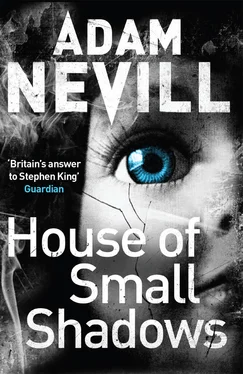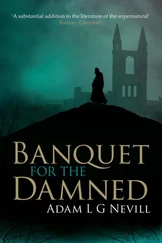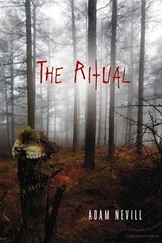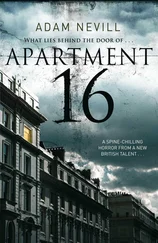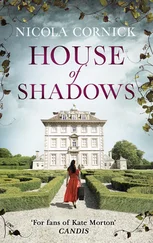Catherine had heard the call back then too, just like she heard it now. ‘Greensleeves’ from a distant ice-cream van. Coming out of those red-brick buildings with plywood over the windows.
That first time, Alice said, ‘I’s going, Caff. Comin’?’ but nothing else. Splashing through the stream and scrabbling up the riverbank to the hole in the fence before Catherine could stop her; up the grassy bank the little figure had climbed on her hands and knees, as Catherine stood motionless with fright behind the wire fence. She’d whispered for Alice to come back. ‘Don’t, Alice. Don’t. We’re not supposed to. You’re not allowed to.’
But Alice had continued up the grass bank to the school where the air was going all wavy up there, over the black roofs, because the special schoolchildren were also moving up the far side of the hill to the buildings. Alice hadn’t seen the ragged shapes intent on meeting her at the summit. And Alice never turned around once, or even seemed to hear Catherine, who stayed behind and gripped the links of the fence.
When Alice disappeared from view amongst the buildings that the other children had reached first and hid within, Catherine wet herself in fright. It was the last time she saw Alice.
Catherine had run and fallen, run and fallen, all the way home. Then shut herself inside her room and stayed there until Alice’s mum came round.
But today Alice was back. And coming closer to the green fence, while the boy with the painted wooden face stayed up on the hill and watched from the distance. And it really was Alice, with the same tangled hair, the pale bespectacled face. Only Alice was happy now.
‘There’s nice kids up there, Caff. There’s Margaret and Annie and all them others. Nice kids. Like us. Come away, come away wiv us, Caff. They’s got nice fings to eat. Ladies in dresses, and flowers. They’s got mices fightin’ battles. Cats is princesses. Foxes wear hats. Them puppet shows from olden times. Everyfing. Always sunny there, Caff. There’s a rabbit that talks and a monkey in a dress. Better than down ’ere.’
Catherine came awake and gasped for air. And some of the dream came out with her, then dissolved and left her thinking of being taken for tests, seeing specialists, being diagnosed as a slow learner. A Mongol, a retard, a thicky.
The bullying at the second school was worse than the first, mainly because the tormenting skills of infants hadn’t sufficiently developed in junior school. She remembered feeling so sick with nerves each morning for the best part of two years that she could barely eat and spent most of her playtimes and dinner breaks hidden in various parts of the small school.
As a child she prayed and wished and prayed, until she gave herself headaches, that the children of the special school would come back and take her away like they did Alice. She’d had her chance when Alice came back for her that afternoon in September, and she’d just relived it in her sleep as clearly as the day it happened. She’d even remembered all of the words.
Had she been asleep or was it another trance? Consciousness had withdrawn so far inside her, the external world was still blurred.
These weren’t memories, she urgently reminded herself. These were childhood fantasies constructed to explain the abduction of Alice. Her friend had never said anything about the Red House on the day she imagined the little girl had come back for her. Or had she? She didn’t know.
The time the boy with the wooden face came into the playground to save her, and the reason why all the children suddenly stopped bullying her, as well as the belief that the teachers were frightened of her, was not real either. None of it.
She felt nauseous in the darkness of the room, as if her brain had just slipped sideways. The slide had been accompanied by a fear of falling, and had jolted her back to the world. Her chin was wet with what she guessed was blood. Thick vestiges of the trance were unclear, but stayed trapped behind her eyes.
Moving into a sitting position hurt her back, her neck, and she suffered a sense of overbalancing. Either that or the room tilted and the bed moved along the floor. She could not see her hands, arms, or the bed in the darkness.
Her skin shivered inside the long gown provided at her bedside. Accepting the nightdress had felt like dependence, or even sublimation. Another item she had been too tired to resist. The ancient garment was ruffled into wet creases along her spine.
The bed she’d awoken in was also dampened by sweat gone cold. Her eyes had been open for some time, too, but she had not been awake. A sense of her jaw being active lingered around her mouth. She must have been talking or crying in her trance.
The bitter, chalky residue left by Maude’s tonic for her chill grew stronger on her tongue. She swallowed and her throat burned. The room stank of wet wood and unclean air.
She groped about the bedside table for the lamp, for the water Maude provided. Her fingertips found the glass and she guzzled the stale liquid, but she could not fit her other hand under the lampshade to find the switch and couldn’t see what she was doing. Her fumbling bumped her phone, which fell off the bedside table and thumped the rug below. As the handset bounced the small screen lit up, casting a pale-green glow over the bed.
Faint underwater light bathed a dense black shape at the foot of her bed, upright, but poised as if to lean over. Either that or it had just retracted from reaching for her.
Her phone settled on its front and smothered the frail light of the screen, leaving her inside a greater darkness than before. Catherine dropped the glass onto the bedspread.
She couldn’t breathe for fright. Her limbs had seized. Beside the thump of a heart that felt too big for her chest, she could think of nothing but the presence at the foot of her bed, one that must have stood inches from her feet as she slept.
Kicking at the sheets she twisted onto her knees, upsetting the glass, which fell and rolled off the mattress to the rug, and onto the wooden floorboards. Around her skull the sound of the rolling glass circled, as if it were inside her head grinding through her panic.
Her useless fingers could not find the neck of the lamp. She was certain the trespasser was swiftly bustling around the outside of the bed, was moments from touching her in the lightless void of the bedroom. When her desperate fingers found the lamp switch, the act of turning the light on took what was left of her strength. Dizzy with terror, she thought she might faint.
Ox-blood walls reappeared around the bed. On the brink of a scream Catherine turned to face the intruder. Her vision swam and settled. The figure was still there, immobile, faceless, waiting.
The dressmaker’s dummy. And hung upon shoulders that were positioned as if the missing head was proudly raised, was the dress Edith had picked out for her to wear to the pageant.
The crashing of relief left her panting like a tired dog. A dull concussive ache returned to the place behind her eyes, as did the burning sensation in her throat. She was nauseous too, as if whatever was in her system was wearing off and leaving side effects.
What had they given her to drink? Were the ingredients of the medicinal concoction so old they’d become toxic? Laudanum? A tincture of opium, wasn’t that bitter tasting? The very idea they took opiates here wasn’t implausible. She imagined old, frail, untrained hands pouring a white powder into the liquid she had struggled to get down. But she was soporific long before she swallowed the ‘tonic’. Something in her food then? Hadn’t Edith said as much about Maude?
The mute housekeeper must have carried the dress and dummy inside the room as she slept. And Catherine had been talking to the dummy, mistaken the vague presence of a dressed bust as company, jabbered to it in her delirium. If she wasn’t so shaken she would have felt foolish.
Читать дальше
